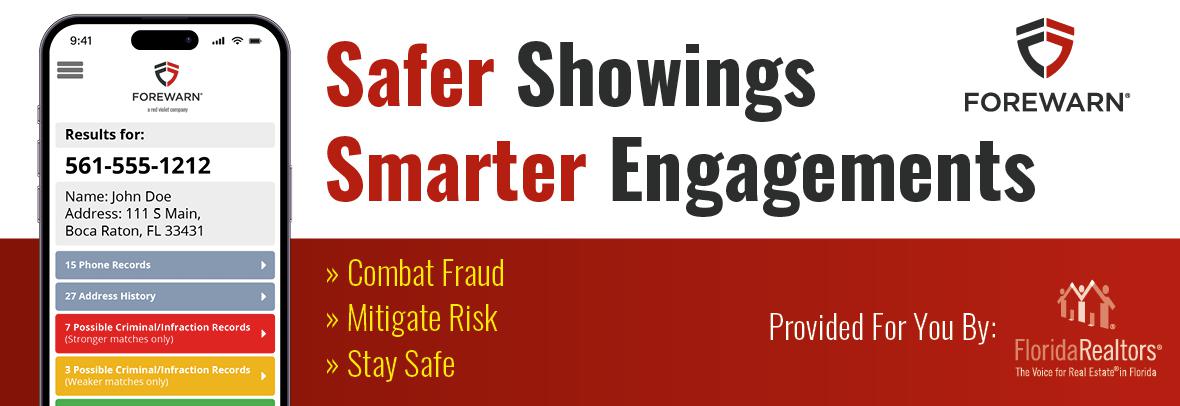
Forewarn Safety App: Stay Safe and Sell
This app helps your agents get instant knowledge on prospective buyers to offer an extra layer of safety to showings.
Forewarn: FREE Member Benefit Offers Instant Background Checks
Recently, when her prospective customer arrived at a showing appointment, a female Realtor® at The Signature Real Estate Companies sensed a potential threat. Noticing his car didn’t correspond with the property’s price tag, she remained in her car. Later, she reverse-Googled the prospect’s contact information, only to discover he’d created his email account days earlier and was using a fake name.
Unfortunately, situations like this occur too often in real estate, says Ben Schachter, broker and president of The Signature Real Estate Companies in Boca Raton. Because real estate agents freely share their photos and contact information, they’re easy targets for crimes, whether physical harm or financial fraud, he explains. Even when there’s no nefarious activity, unqualified prospects can waste an agent’s time and resources. “Since Realtors stand to potentially make substantial commissions, we typically take more risks than salespeople in other professions,” says Schachter. “And sometimes we let our guard down when making decisions.”
That’s why Schachter is an enthusiastic advocate of Forewarn, an app-based solution providing instant knowledge so agents can better assess risk prior to face-to-face meetings. Having introduced the app to his agents five years ago, he’s heartened that Florida Realtors® will soon be providing Forewarn to all its members for free. Here’s how he’s been encouraging his team to leverage this important tool.
Encouraging adoption of Forewarn
• Schachter and his colleague, Marshall Sklar, owner of Florida’s Best Realty Services, teamed up to host an in-person and Zoom presentation from Forewarn. The company explained to agents how the product works and could help their business.
• Each day, Schachter sends several emails to his team. In many, he relates horror stories (where Forewarn would have been helpful) and success stories (where Forewarn added value). “Agents think bad things will never happen to them,” he says. “We find they learn best when we give them real-world scenarios, with practical rather than theoretical education.”
Using Forewarn
• Agents should vet each new prospect as early as possible—ideally during the first phone call.
• Schachter trains his agents to weave data gleaned from Forewarn in conversations with prospects, for instance asking where they went to school. If their answer doesn’t match the information, agents will know something is amiss.
• Agents should also use the data to establish rapport, shortening the sales cycle. For instance, they can tell prospects if they’re from the same state or share a rival sports team. This way, they can eliminate one to two hours of relationship-building, estimates Schachter.
• If prospects ask agents how they know so much about them, Schachter tells his agents to be upfront. “I’ll say, ‘I’m sure you can respect that I need to look after my welfare and time, so I always do a little bit of homework. I’d expect you’re doing similar homework on me.’” He’ll also explain that researching prospects helps him provide better service and more effective results.
Protecting agents
“Before we started using Forewarn, we didn’t know more about potential new customers than what we could Google—and Google only has so much information,” says Schachter. “Forewarn is vastly more reliable, efficient and professional. Plus, with Forewarn, we learn things prospects don’t want us to learn. I’m grateful to Florida Realtors for prioritizing the safety and welfare of Realtors by giving them this tool.”
Here's what Forewarn can do
Forewarn is an identity verification and risk assessment tool designed to empower real estate professionals to better understand customers and serve them more effectively. After inputting a prospect’s phone number, the app will quickly reveal the following:
- • their name, phone number and address
- • their phone records
- • their address history
- • whether they have a criminal history
- • whether they have any court records (bankruptcies, liens, judgments and foreclosures)
- • their current assets (properties and vehicles)
Dina Cheney is a Connecticut-based freelance writer.

